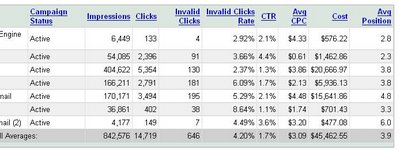

Finally, Google has bowed to pressure and given advertisers a way to see what it calls "invalid clicks". Anyone managing a large account has known that Google chucks random little amounts as account credits, which are explained as refunds for invalid clicks.
I have said in this blog for some time and in WIRED magazine that Google is good at keeping click fraud at bay, so I am not surprised to see a low rate of invalid clicks in one account.
Several participants in the AdWords forum on Webmasterworld have shared their own invalid click statistics. It seems to be below 4% for most of the posters.
But it all depends on the total spend. For a $45,000 spend, 4.2% is worth $1900 of savings because Google detected it. For a $65,000 spend, 3.7% invalid clicks add up to $2400. Advertisers can still speculate how many invalid clicks won't be picked up by Google. The "get paid to read ads" scams are still around.
Back to the WW discussion, europeforvisitors made a good point, "ROI is what determines whether an advertiser is in or out." Many advertisers seem to treat invalid clicks just as a retailer treats shoplifting - as long as the ROI is good, click fraud is part of the cost of doing business.
There is still a place for independent click fraud detection services. It would be great if Google were to release some more information about those invalid clicks - where they came from, IP addresses, time of day, number of clicks from each source. This is unlikely to happen, as it would drag Google into lawsuits between advertisers and the alleged invalid clickers.

